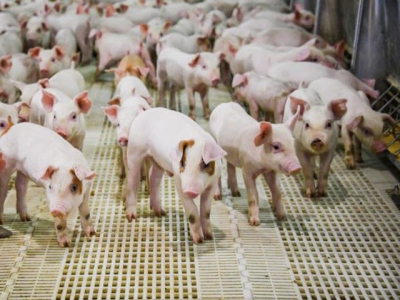Zinc may influence gut health, immune competence of pigs

Follow-up research to examine high-zinc dietary interventions under immune challenge conditions.
A high concentration of zinc (as zinc oxide) in diets fed to piglets during the postweaning period potentially modulate the animal’s intestinal microbiota and development of its local immune system, according to an Oct. 7 announcement from Wageningen University & Research (WUR) in the Netherlands.
A high zinc intervention was used as a model to study opportunities for dietary interventions to influence gut functionality in pigs, WUR said, citing research published in 2016.
Dr. Dirkjan Schokker with WUR said results from the studies indicate that providing a high-zinc diet from days 14 to 23 postweaning modulates the pig’s gut microbiota composition and intestinal functioning based on effects of gene expression in intestinal tissue.
The effects on the microbiota profile were more pronounced in the distal part compared to the proximal parts of the small intestine, he added. Various gene expression pathways, in part related to the local immune system in the gut, were affected by a high level of zinc in the diet as a model intervention.
In a follow-up study, Schokker said the research team confirmed that the third week after weaning is still an appropriate window to modulate gut functionality and indices of gut health in piglets.
Schokker said while it has been shown that gut health indices can be modulated, information is still lacking on the extent to which the observed changes are beneficial for pigs in different conditions. Therefore, in follow-up research, the researchers will investigate the effects of the same intervention under an immune challenge condition.
WUR said the studies were performed within the framework of the public/private partnership Feed4Foodure. The results of this research contribute to the understanding of possibilities to support gut health and immune competence of piglets via dietary interventions.
Có thể bạn quan tâm
 Precision feeding may lower pig dietary protein needs, nitrogen excretion
Precision feeding may lower pig dietary protein needs, nitrogen excretion Swine precision feeding systems may need new methionine to lysine ratios, however, the individualized system may allow for swine production with lower protein
 Study: Fasting on the day of weaning improves piglet performance in subsequent weeks
Study: Fasting on the day of weaning improves piglet performance in subsequent weeks A short-term delay in the provision of feed increased piglets’ body weight three weeks after weaning, while an effect on feed intake was visible during the five
 Glutamic acid shown to improve the feed efficiency of weaned piglets
Glutamic acid shown to improve the feed efficiency of weaned piglets Adding nucleotides or glutamic acid to the diets of weaned piglets may encourage growth performance, while nucleotide supplementation may improve gut developmen